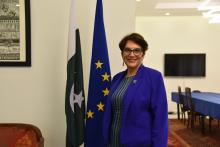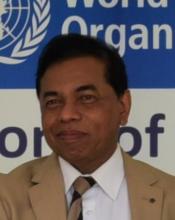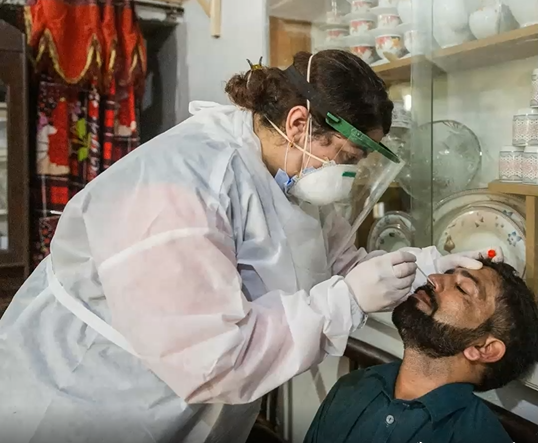Resources are being redirected away from essential services in Pakistan as rising cases of COVID-19 overstretch the country’s health system. Services for many other health conditions have come to a halt.
Disruption of essential services can have devastating consequences such as future outbreaks of vaccine-preventable diseases and increase in maternal mortality. The population could also lose trust in the health system and not take advice on infection control.
Pakistan is taking strategic decisions so that its limited resources can provide maximum health benefits to its people. Strengthening primary health care is a proven approach to ensure health for all, especially in times of crisis.
WHO and partners prepared an action plan to support the Government in maintaining essential health services; a significant pillar in Pakistan’s Preparedness and Response plan for COVID-19.

“The UHC partnership will help alleviate the social-economic impacts of the COVID-19 pandemic in Khyber Pakhtunkhwa and Gilgit-Baltistan through strengthening primary health care and addressing the issue of maintaining safe blood transfusion services."

“With the support of the UHC Partnership, UNICEF Pakistan is working on community awareness, specifically for mothers and children, to fight COVID-19 at the grassroots and primary health care level. In collaboration with Radio Pakistan, we have launched weekly radio programmes on COVID-19 called ‘Qadam Qadam Sehat’ to raise community awareness.”

“The UK government is committed to supporting Pakistan through the COVID-19 crisis. We have been working closely with WHO to channel rapid response funds to enable them to support the Pakistan Preparedness and Response Plan. We continue to partner with WHO Pakistan as the country progresses towards the resumption of essential services particularly for the vulnerable and marginalised groups and those hardest hit by COVID-19. As Pakistan recovers from the crisis, it is important that the system is built back better - the implementation of universal health coverage and disease control priorities is critical for this.”

“The EU in Pakistan is proud to support, through the UHC Partnership, programmes focusing on empowering communities to better engage with local governments to strengthen the health system.”

“An effective response to COVID-19 requires a resilient health system. This is not possible without strengthening primary health care. In Pakistan, the Ministry of Health, with the support of WHO, has initiated several activities to transform the health system through strengthening primary health care."
THE LONG READ
A mother with her young child waits anxiously for a chance to speak to a Member of Parliament and Speaker of the National Legislative Assembly to ask for help during one of his open meetings. Her child is due for a vaccination, but the service has been suspended.
The family, like millions of others across the world, has been unable to access basic health care as COVID-19 continues to overwhelm health systems. Pakistan has suspended essential services such as immunization, antenatal care and family planning.
While the Government has demonstrated a strong resolve to deliver on the promise of health for all through universal health coverage (UHC), the health system is under immense strain from COVID-19. The first two confirmed cases in the country were reported on 26 February 2020. In about seven months, this number reached 306,886 with 6,424 lives lost (as of 22 September). The majority of cases are transmitted through the community.
Pakistan, with support from WHO, is working to strengthen basic primary health care. This will help ensure that the population receives the services they need during the pandemic, as close as possible to the communities in which they live. Ultimately, it will contribute to progress towards achieving UHC.
“An effective response to COVID-19 requires a resilient health system. This is not possible without strengthening primary health care. In Pakistan, the Ministry of Health, with the support of WHO, has initiated several activities to transform the health system through strengthening primary health care. This includes a family practice approach, a primary health care measurement and improvement initiative, development and implementation of a UHC priority benefit package, an Islamabad Capital Territory model healthcare system for UHC, an integrated people-centered healthcare services initiative, and numerous activities for private sector engagement,” said Dr Palitha Mahipala, WHO Representative in Pakistan.
Meeting all health needs in times of crises
Even in the wealthiest parts of the world, countries have been under pressure to keep their health systems well-organized and prepared to maintain essential health services for everyone as COVID-19 rages on.
Ill health and death as a result of lack of essential services is as devastating as the suffering inflicted by COVID-19 for families, communities and countries as a whole. In addition, people start to lose trust in their health system. Maintaining trust is essential to motivate people to follow advice to safeguard their health and to control infections in health facilities.
But in Pakistan today, many services for illnesses that are unrelated to COVID-19 have stopped, with multiple primary health care services on hold. Community health workers, vaccinators, community midwives and family welfare assistants are unable to perform outreach services.
The pandemic is limiting women’s access to life-saving maternal and newborn health services. Lockdowns and travel restrictions disrupt regular supply chains of essential medicines and health products and creates a gap in the stock of essential vaccines, leading to the disruption of immunization services. This results in another major threat: future outbreaks of vaccine-preventable diseases, a fear that is generating global concern.

Reinstating essential health services for its whole population is therefore one of Pakistan’s most urgent challenges.
The Government is carefully calibrating decisions to ensure that its limited resources can bring the greatest impact for the people. Strengthening primary health care is a core part of the drive to ensure essential services reach everyone. WHO, through the UHC Partnership, along with a host of partners such as the United Nations Children’s Fund (UNICEF), the United Nations Population Fund (UNFPA), the Joint United Nations Programme on HIV and AIDS (UNAIDS), World Bank and the United States Agency for International Development (USAID) have collaborated to prepare an action plan to support the Government in ensuring the continuity of essential diagnostic, treatment and prevention services during the COVID-19 response, while protecting the safety and wellbeing of the health workforce and patients.
The plan draws upon the latest WHO operational guidance for maintaining essential health services during the COVID-19 outbreak and has become a significant pillar of Pakistan’s COVID-19 Preparedness and Response plan.
“An effective response to COVID-19 requires a resilient health system. This is not possible without strengthening primary health care."
Dr Palitha Mahipala, WHO Representative in Pakistan

Strengthening primary health care services
As governments meeting at the UN General Assembly in 2019 acknowledged during the High Level Meeting on UHC, well-functioning, resilient health systems based on primary health care are the bedrock for achieving UHC. They are also key to successfully preparing for and responding to health emergencies such as COVID-19. Although Pakistan has undertaken some health sector reforms in the past two decades, it still has some way to go in the process of building its capacity to deliver primary health care.
WHO consulted with all health partners to develop the National Health Vision 2025 and provincial health sector strategies and plans. There was strong consensus: the evidence is clear that primary health care offers the best approach for countries to bring care as close as possible to where people live, deliver services cost-effectively, enhance universal access to services, and prioritize reaching those who are most vulnerable and disadvantaged.

For several years, WHO has supported Pakistan’s effort to expand primary health care and engage citizens in health policy dialogue. This work has gained momentum during the last two years through the support of the UHC Partnership. The Partnership assists 115 countries in accelerating progress to achieve UHC through funding provided by the European Union (EU), the Grand Duchy of Luxembourg, Irish Aid, the Government of Japan, the French Ministry for Europe and Foreign Affairs, the UK Department for International Development and Belgium.
“The EU in Pakistan is proud to support, through the UHC Partnership, programmes focusing on empowering communities to better engage with local governments to strengthen the health system,” said H.E. Androulla Kaminara, Ambassador of the European Union to the Islamic Republic of Pakistan.


WHO and UNICEF have worked jointly to revitalize Pakistan’s pioneering community health worker programme, the ‘Lady Health Workers’. The process, which originated in 1994, created a new cadre of female health workers in the Pakistan health system to address unmet health needs of rural populations and informal settlers.
WHO is also helping the Government to implement the Family Practice programme in 12 districts across Pakistan. The approach increases households’ access to health care at an affordable cost, through family practice teams led by a family physician. By working in communities, these groups of health care providers have the best knowledge of the health and life conditions of all members of a family and can therefore support them more effectively with preventive health interventions.
In addition, WHO has identified five areas where all the collaborative activities between WHO and the Government of Pakistan under the WHO Country Support Plan will be demonstrated. This opens opportunities for more partners to work towards the shared vision of health for all.
“The UHC partnership will help alleviate the social-economic impacts of the COVID-19 pandemic in Khyber Pakhtunkhwa and Gilgit-Baltistan through strengthening primary health care and addressing the issue of maintaining safe blood transfusion services,” said Mr Sebastian Jacobi, Director, KfW Pakistan.
Pakistan is also a signatory to the International Health Regulations (IHR) 2005 and is committed to building resilient health systems that can adapt and respond to challenges posed by outbreaks, other health hazards and emergencies of national and international concern. In 2016, Pakistan successfully conducted a Joint External Evaluation of its IHR core capacities, which formed the basis of its five-year IHR National Action Plan.

Risk communication and community engagement
The UHC Partnership is also supporting a range of other projects such as risk communication and community engagement as part of the national response to COVID-19.
The national risk communication and community engagement (RCCE) strategy has been developed by the National Core Committee on COVID-2019 based on global and national technical advice. Healthcare workers, the media and religious and community leaders will receive training on risk communication, social mobilization and community engagement. Information, education and communication materials guided by the strategy will also strengthen public awareness through traditional and digital media.
Parliamentarians from throughout the country have been requested to actively ramp up public education by spearheading the awareness campaign in their respective constituencies. The programme also includes community outreach and awareness-raising through broadcast media, and supporting women and girls’ livelihoods through the production of facemasks.
“With the support of the UHC Partnership, UNICEF Pakistan is working on community awareness, specifically for mothers and children, to fight COVID-19 at the grassroots and primary health care level. In collaboration with Radio Pakistan, we have launched weekly radio programmes on COVID-19 called ‘Qadam Qadam Sehat’ to raise community awareness,” said by Dr Aida Girma, Country Representative for UNICEF in Pakistan.
“The UK government is committed to supporting Pakistan through the COVID-19 crisis. We have been working closely with WHO to channel rapid response funds to enable them to support the Pakistan Preparedness and Response Plan. This includes vital areas of disease surveillance, laboratory strengthening, case management and behaviour change communication. We continue to partner with WHO Pakistan as the country progresses towards the resumption of essential services particularly for the vulnerable and marginalised groups and those hardest hit by COVID-19. As Pakistan recovers from the crisis, it is important that the system is built back better – the implementation of universal health coverage and disease control priorities is critical for this,” said Annabel Gerry, Head of the Department for International Development (DFID) of the United Kingdom in Pakistan.


Looking forward
As Pakistan tackles the dual challenge of responding to COVID-19 and maintaining essential health services, WHO is working alongside the Government and health partners, providing support and guidance in reinstating and expanding primary health care services to ensure that everyone in the country can access the services they need, during and after COVID-19.
